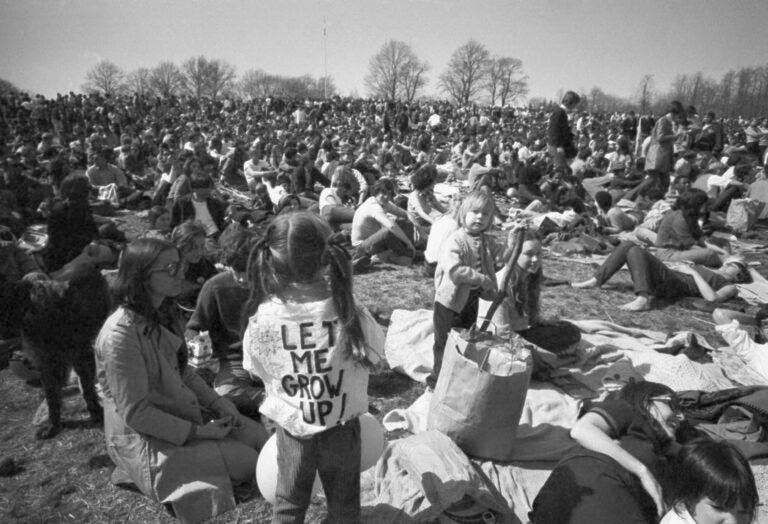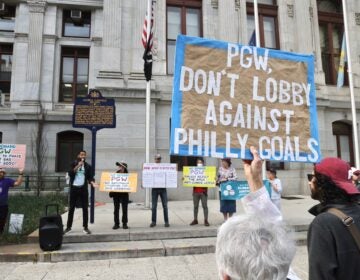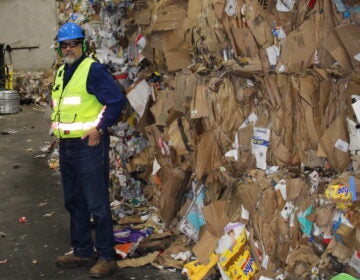Coronavirus brings PPE waste, clearer skies, and nostalgia for Philly’s first Earth Day 50 years ago
StateImpact Pennsylvania reporter Susan Phillips talks to Morning Edition host Jennifer Lynn about COVID-19 waste and the first Earth Day in Philly.
Listen 7:12
In this April 23, 1970, file photo, part of crowd observing Earth Day, including, youngster wearing "Let Me Grow Up:" sign on back relaxes on hilltop in Philadelphia's Fairmount Park in Philadelphia. (AP Photo)
Today marks the 50th anniversary of Earth Day, which has deep roots in Philadelphia.
The day celebrates environmental protection, a multifaceted topic that StateImpact Pennsylvania’s Susan Phillips brings into focus for us year-round as an energy and environment reporter.
Susan spoke with Morning Edition host Jennifer Lynn about Earth Day in the context of COVID-19, the problem with people discarding their masks and gloves in the streets, and the significance of Earth Day to our region.
—
Hello.
Hi, Jennifer.
Susan, before we get to talking, I have some audio that I think you might appreciate. I recorded these sounds over the weekend. What do you think you heard?
Well, there’s definitely some geese in there and probably a robin, I’m guessing. They’re very common right now, especially building their nests. But also, I think I heard some bees.
Well, we got the angry geese that I disturbed near their nest, and I apologized to them. The robin, also a bit irritated with me. I think I was close to its nest. And then the bees sound was carpenter bees. They were mating very publicly. Anyway, Susan, this Earth Day falls at a unique time. We have our pandemic. There are some basic things that are going on that Mother Earth maybe would not approve of with the disposal of all of our personal protection. You’ve been reporting on this.
Yeah, and this is happening all over the country. So the EPA is putting out press releases, water departments, sewage treatment plants are all trying to tell people to stop flushing disinfecting wipes or the sanitary wipes down the toilet. In Philadelphia, the Water Department told me that their workers cleared about 100 pounds of this type of material out of the pumps in about a three-week period in March after the COVID-19 shutdown hit. And they usually take a whole year to clear that much material. It’s an issue. The other thing that’s also happening, and I think, you know, people are glad that people are wearing masks and gloves and trying to be as sanitary as possible. But there’s also been this increase in litter, COVID-19 litter, which is gloves and masks just being tossed in the street. And, of course, that litter gets washed down stormwater drains and ends up in the sewer system, and again, clogs pipes and makes life difficult.
I’ve seen the masks and the gloves on the ground. The masks, you know, some people are getting the kind that are pre-made. I’ve been wondering about masks, the ones that we make ourselves that are reusable, made of materials that we already have.
Right.
So these sort of sustainable masks. You made one yourself. What did you use?
I made a couple of them. I used a dish towel, basically, and thread. I don’t have a sewing machine. You know, it was back to seventh-grade sewing lessons for me. I just used shoelaces for the ties.
And how about the air that we’re breathing through these masks? I mean, have you noticed a difference in the air we breathe? Anecdotally, I’ve heard people say the air seems cleaner with fewer cars on the road. Is there any data to support that?
People are talking about how clear the sky is. I know a lot of people have asked me about that and have been noticing, hey, this sky looks bluer and there is data to back that up from NASA. So NASA satellite footage is showing a 30% decrease in nitrogen dioxide emissions, if you compare March of this year to March of previous years on average. And they’re seeing that up and down the I-95 corridor. So, of course, that includes Philadelphia. The reason that nitrogen dioxide is bad is, you know, it comes from cars and power plants. It’s what helps form smog and acid rain and ground-level ozone. And that contributes to increased respiratory infections and asthma.
Anything else indicating that?
Well, one of the other interesting reports that was out recently is a preliminary report out of Harvard University that shows that people are more likely to die from COVID-19 if they live in an area with high levels of air pollution, such as nitrogen dioxide. And they’re much more likely to die than those folks who don’t live in highly polluted areas. Cities like Philadelphia and Pittsburgh, of course, are some of the most polluted in the country.
Before we wrap up, I want to get a sense of the deep roots of Philadelphia related to the first Earth Day story. What can you share about that?
The original Earth Day, especially in Philadelphia, turned into a whole week of activism. You know, teach-ins, concerts in Fairmount Park. It was a pretty big deal because poets like Allen Ginsberg read, the activist Ralph Nader, and even if folks remember Dr. Benjamin Spock showed up to speak to crowds of people in Fairmount Park. Even the cast from the Broadway hit “Hair” came and performed it at noon Fairmount Park for Earth Day.
Seriously?
Yeah, it was a big deal here. It did mark, you know, sort of this turning point in society’s view of the environment, and a lot of environmental laws like the Clean Air Act, the Clean Water Act, of course, were being rolled out at that time as well.
Thank you. Susan Phillips is WHYY’s StateImpact Pennsylvania energy and environment reporter. I appreciate your time, Susan.
You’re welcome.
I think we have a clip that you brought of Dr. Spock.
WHYY is your source for fact-based, in-depth journalism and information. As a nonprofit organization, we rely on financial support from readers like you. Please give today.



![CoronavirusPandemic_1024x512[1]](https://whyy.org/wp-content/uploads/2020/03/CoronavirusPandemic_1024x5121-300x150.jpg)


